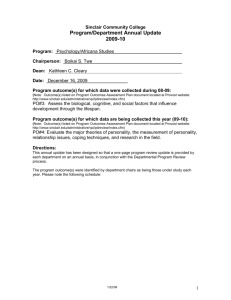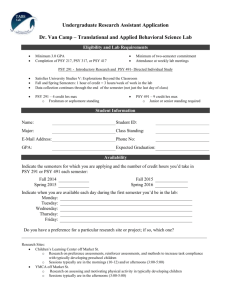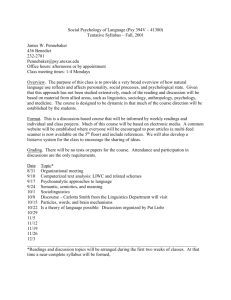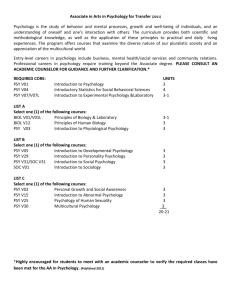Complete Psychology Revision Proposal
advertisement
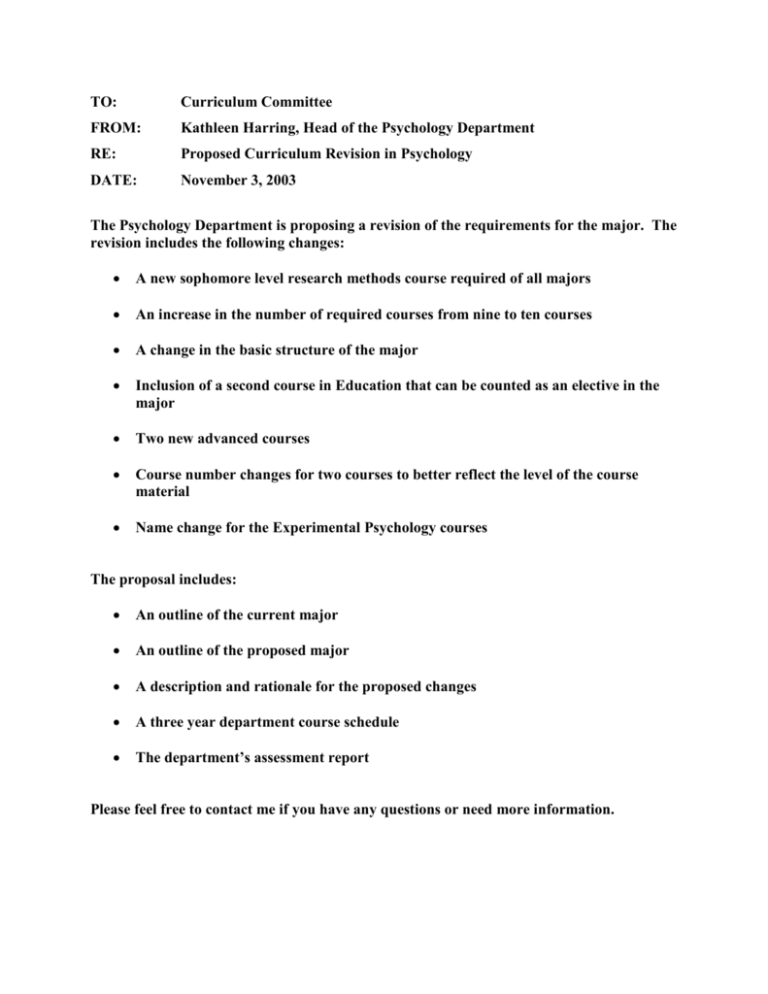
TO: Curriculum Committee FROM: Kathleen Harring, Head of the Psychology Department RE: Proposed Curriculum Revision in Psychology DATE: November 3, 2003 The Psychology Department is proposing a revision of the requirements for the major. The revision includes the following changes: A new sophomore level research methods course required of all majors An increase in the number of required courses from nine to ten courses A change in the basic structure of the major Inclusion of a second course in Education that can be counted as an elective in the major Two new advanced courses Course number changes for two courses to better reflect the level of the course material Name change for the Experimental Psychology courses The proposal includes: An outline of the current major An outline of the proposed major A description and rationale for the proposed changes A three year department course schedule The department’s assessment report Please feel free to contact me if you have any questions or need more information. Current Major Requirements Majors will complete a minimum of nine courses in the department. PSY 101 Introductory Psychology (B) PSY 103 Psychological Statistics (Prereq: PSY 101, and MTH 104 or MTH 121) And at least one course from the following three areas: Fundamental Processes, Social and Personality, and Research and Design FUNDAMENTAL PROCESSES PSY 201 Learning & Behavior (Prereq: PSY 101) PSY 207 Sensation & Perception (S) (Prereq: PSY 101) PSY 301 Cognitive Processes (Prereq: PSY 101) PSY 308 Biological Psychology (S) (Prereq: PSY 101) SOCIAL AND PERSONALITY PSY 202 Social Psychology (Prereq: PSY 101) PSY 203 Personality Psychology (Prereq: PSY 101) PSY 204 Child Psychology (Prereq: PSY 101) PSY 205 Psychology of Adolescence (Prereq: PSY 101) PSY 206 Psychology of Adulthood and Aging (Prereq: PSY 101) PSY 213 Abnormal Psychology (Prereq: PSY 101) PSY 304 Psychotherapy & Counseling (Prereq: PSY 101) RESEARCH AND DESIGN (lecture/lab courses – 5 contact hours) PSY 401 Experimental Psychology – Conditioning (Prereq: PSY 103, and PSY 201 or 308) PSY 402 Experimental Psychology – Social Behavior (Prereq: PSY 103 and PSY 202) PSY 403 Experimental Psychology – Perception & Cognition (Prereq: PSY 103, and PSY 207 or 301) PSY 404 Experimental Psychology – Clinical Research (Prereq: PSY 103, and PSY 213 or 304) ELECTIVES EDU 212 Exceptional Learner (B) (Prereq: PSY 101 or PSY 204 and admission to the teacher certification program. PSY 302 History of Psychology (Prereq: 5 or more previous courses in psychology) PSY 309 Tests & Measurements (Prereq: PSY 103) PSY 310 Industrial/Organizational Psychology (Prereq: PSY 103 or MTH 104) PSY 314 Psychology of Women (Prereq: PSY 101) PSY 420-429 Perspectives in Psychology (varies with course topic) PSY 4XX Special Topics Courses (varies with course topic) INDIVIDUALIZED INSTRUCTION (only one unit of each may count for the major) PSY 960 Psychology Internship PSY 970 Psychology Independent Study/Research PSY 270 Research Apprenticeship (.5 course credit, does not count for the major) 2 Proposed Major Requirements Majors will complete a minimum of ten courses in the department and one cognate course in the Mathematical Sciences department. Required Courses (4) PSY 101 Introductory Psychology (B) PSY 103 Psychological Statistics (Prereq: PSY 101, and MTH 104 or MTH 121) PSY 104 Research Methods in Psychology (Prereq: PSY 103) New course and ADVANCED LABORATORY COURSES (choose one) Lecture/lab courses – 5 contact hours) PSY 401 Advanced Lab in Conditioning (Prereq: PSY 103, PSY 104, and PSY 201 or 308) PSY 402 Advanced Lab in Social and Personality (Prereq: PSY 103, PSY 104, and PSY 202 or PSY 203) PSY 403 Advanced Lab in Perception & Cognition (Prereq: PSY 103, PSY 104, and PSY 207 or 301) PSY 404 Advanced Lab in Clinical Research (Prereq: PSY 103, PSY 104, and PSY 213 or 304) Core Courses (3) Students take at least one course from each of the following three areas: Fundamental Processes, Social and Personality, and Clinical and Developmental. Advanced Courses and Seminars (2) Students take at least two courses from the list of advanced courses and seminars. Elective Course (1) Students choose one course from the list of course offerings in psychology. EDU 102/103 or EDU 212 may also be counted as an elective for the major. Cognate Course (1) Students take one of the following courses as a prerequisite for PSY 103. MTH 104 Statistical Methods (G) MTH 121 Calculus I (G) ___________________________________________________________________________ Core Courses FUNDAMENTAL PROCESSES PSY 201 Learning & Behavior (Prereq: PSY 101) PSY 207 Sensation & Perception (S) (Prereq: PSY 101) PSY 208 Biological Psychology (S) (Prereq: PSY 101) Course # changed to 200 level SOCIAL AND PERSONALITY PSY 202 Social Psychology (Prereq: PSY 101) PSY 203 Personality Psychology (Prereq: PSY 101) 3 CLINICAL AND DEVELOPMENTAL PSY 204 Child Psychology (Prereq: PSY 101) PSY 205 Psychology of Adolescence (Prereq: PSY 101. Recommended: PSY 204) PSY 213 Abnormal Psychology (Prereq: PSY 101) Advanced Courses and Seminars PSY 301 Cognitive Processes (Prereq: PSY 104) PSY 302 History of Psychology (Prereq: 5 or more previous courses in psychology or permission of instructor) PSY 304 Psychotherapy & Counseling (Prereq: PSY 101 and either PSY 203 or 213 or permission of instructor) PSY 306 Psychology of Adulthood and Aging (Prereq: PSY 101 and PSY 205 and at least one other course in psychology. Recommended for Juniors and Seniors) Course # changed to 300 level PSY 309 Psychological Assessment (Prereq: PSY 103, Recommended: PSY 104) Name change PSY 310 Industrial/Organizational Psychology (Prereq: PSY 103 or MTH 104) PSY 314 Psychology of Women (Prereq: PSY 103 or WST 101) PSY 3XX Child Psychopathology (Prereq: PSY 213) New course PSY 3XX Psychopharmacology (Prereq: PSY 208 or BIO 151) New course PSY 3XX Special Topics Courses (Prereq: varies with course topic) PSY 420-429 Perspectives in Psychology (Prereq: varies with course topic) ELECTIVES EDU 102 or 103 Educational Psychology (Prereq: EDU 101 and admission to the teacher certification program or permission of instructor.) Meets W requirement when offered as 103. EDU 212 Exceptional Learner (B) (Prereq: PSY 101 or EDU 101). INDIVIDUALIZED INSTRUCTION (only one unit of each may count for the major) PSY 960 Psychology Internship PSY 970 Psychology Independent Study/Research PSY 270 Research Apprenticeship (.5 course credit, does not count for the major) Students who are accepted into the Teacher Education certification program may count EDU 212 (Exceptional Learner) to satisfy one of the courses in the Advanced Course and Seminar requirement and they may count EDU 102 or 103 (Educational Psychology) as an elective in the Psychology major. DESCRIPTIONS AND RATIONALE FOR PROPOSED CHANGES TO PSYCHOLOGY MAJOR 1) Sophomore level required course - Research Methods in Psychology PSY 104 Research Methods in Psychology An exploration of the methodological issues and strategies that are most germane to research in psychology. Topics include types of research designs, ethics, measurement, library 4 resources, and a review of data analysis procedures. Scientific writing and oral presentations of research results will be emphasized. Four hours lecture/lab. Prereq: PSY 103 For several years the Psychology department has been debating the inclusion of a required course in Research Methods. Currently, students gain a beginning understanding of methodology issues and techniques in the Introductory Psychology course where they are required to complete at least two lab projects. Majors are then encouraged to take Psychological Statistics during the sophomore year where they learn about descriptive and inferential statistics, application of statistical tests, scientific writing, and statistical software commonly used in psychology research (e.g., SPSS). While research methodology is included in this course, it is a secondary focus. Students learn about research designs in terms of the statistical tests used to analyze the designs. While majors may learn about research methods in other 200 or 300 level courses (e.g., Social Psychology, Personality Psychology, Sensation & Perception, Abnormal Psychology), there is not a comprehensive focus on this topic. It is only when students take one of our Experimental Psychology lab courses (writing intensive advanced research courses) in the spring of their junior year or in their senior year that methodological issues and designs are given a central focus. However, the emphasis is on an advanced understanding and application of methodology in specific subfields of psychology. While our stronger students, many of whom come into the class with independent research experience, are usually able to make the transition without substantial review of basic concepts, the average student comes into the class without a solid understanding of fundamental research methods. Our recent department curriculum assessment (see attached report) provided evidence to support our concerns about the development of student research skills. The results of our survey of senior majors showed that students perceived the development of critical thinking, research, and writing skills to be a strength of our program. The Experimental Psychology courses were noted as very important in honing these skills. The members of the Psychology department agreed that one of our strengths was providing students with strong research skills; however, many students were learning these skills late in their college career and thus not being given opportunities to develop them at a more sophisticated level. The results of our assessment of students’ knowledge about research methodology before taking the Experimental Psychology course indicated that many students did not have a solid understanding of research and statistical concepts. We also found considerable variability among student scores. These findings were not surprising given that 86% of the students had completed the Psychological Statistics course three or more semesters earlier. The APA Task Force Report on National Guidelines and Suggested Learning Outcomes for the Undergraduate Psychology Major lists research methods (guideline 2) and critical thinking skills (guideline 3) as two of the ten expectations for the psychology major. See 5 the department web site for our mission statement and objectives. http://www.muhlenberg.edu/depts/psychology/mission.htm National studies of undergraduate psychology curricula have consistently indicated that a research methods or experimental design course is among the most frequently required courses in the major (behind only Introduction to Psychology and Statistics). A review of the programs at our sister institutions showed that Lafayette, Gettysburg, Moravian, and Lehigh require a two course Statistics and Research Design sequence. While Franklin and Marshall, Bucknell, and Colby only require one Statistics/Design course, these programs require several advanced laboratory courses. In order to implement the required Research/Methods course beginning Fall 2005 we need to make sure that seats are available for majors from the Classes of 2007 (this year’s first year students) and 2008 to take Math 104 (Statistical Methods) by the end of the 2004-2005 academic year. In a discussion with George Benjamin, we learned that the Math department is currently teaching an additional section of the course this year (which allowed some first year students to enroll this semester) and has agreed to offer two additional sections next year. These additional sections should provide enough seats for the sophomores who have not yet taken the course and for first year students who want to major in psychology. 2) An increase in the number of required courses from nine to ten courses The need for the research methods course was clearly dictated by our departmental assessment and was unanimously supported by the members of the psychology department. We favor adding research methods as a tenth course rather than supplanting a course requirement to make room. Adding the research methods course while maintaining a 9course requirement would result in students taking one fewer content course than under the current major (5 vs. 6). Given the breadth of the discipline, we did not feel that 5 content courses would adequately support the goals specified in the department mission statement or in the APA Task Force Report on National Guidelines and Suggested Learning Outcomes for the Undergraduate Psychology Major (Goal #1 refers specifically to breadth and depth in content areas of psychology). Further support for a ten-course psychology major comes from our review of other psychology programs. With regard to the total number of courses, Franklin and Marshall, Lafayette, Gettysburg, and Colby College all require at least ten courses. Furthermore, the percentage of courses required for the proposed major in relation to college graduation requirements is also consistent with Psychology majors at other liberal arts institutions. A student completing the minimum requirements under the proposed major would complete 29.4% of the college graduation requirements inside the major (10 of the 34 courses). This percentage is comparable to those at Franklin and Marshall (31.25%), Lafayette (31.25%), Gettysburg (31.42%), and Colby (30%). Increasing the number of courses in the major should not have a great deal of impact on most of our students. For the 70 majors who graduated in 2003, 45 students took more than nine 6 courses in the major. Of the 14 students who were also enrolled in the Education Certificate Program, six took more than the nine required courses. 3) A change in the basic structure of the major The department also proposes a change in the structure of the major designed to preserve both breadth and depth in the major while providing a more hierarchical sequence. Developed in 1989, the current program was designed to provide students with a basic foundation in psychology and flexibility in shaping the major to individual interest. While it has succeeded in meeting these goals, many students graduate with an understanding of psychology that is limited in scope and sophistication. Our proposed program insures that students will be exposed to a variety of basic topics and skills in psychology (e.g., required courses and 200 level courses), as well as giving them the opportunity to explore more advanced topics in psychology (e.g., 300 and 400 level courses). Previously, we had no requirement that students take 300 or 400 level courses, except for the Experimental Psychology course. 4) Inclusion of a second course in Education that can be counted as an elective in the major Because many students in the Teacher certification program are psychology majors, we consulted with the Education department regarding the proposed changes to the psychology major. In a meeting with Michael Carbone and Sally Richwine to review an earlier version of our proposal, we determined that a psychology major who is in the Teacher Certification program would have to take three semesters of five courses to complete the ten course major – even though EDU 212 (Exceptional Learner) is (and has been for at least 20 years) an elective in our major. Since the department thought this created an undue burden on these students, we changed the proposal to permit Education students to count EDU 102 (103) and EDU 212 as two of their ten required courses. Our review of these courses indicated that the content and objectives provide outcomes that meet the department’s goals. Note also that we allow students to count one course unit of Independent Research or Internship as one of the ten courses. 5) Two new advanced courses in psychology PSY 3XX Child Psychopathology An exploration of emotional, behavioral, developmental, and learning disorders in children and adolescents. This course emphasizes the interdependence of biological, psychological, and social/cultural factors in the etiology, course and treatment of childhood disorders. Prerequisites: PSY 213 PSY 3XX Psychopharmacology An exploration of the key concepts and principles of how drugs and brain chemistry affect behavior. Topics will include basic pharmacology, research methods, states of consciousness, reinforcement and addiction, and the treatment of psychological disorders. Prerequisites: PSY 208 or BIO 151or permission of instructor. 7 We are proposing the addition of these courses to provide students more opportunities for the exploration of specialized topics in psychology. Traditionally, our program has been a bit “bottom heavy” with more 200 level courses than 300 and 400 level courses. Since our revised program requires students to take at least two 300 level courses, we need to offer a broader list of choices for students – specifically choices that allow them to deepen their understanding of a specific area in psychology. These two courses also take advantage of the expertise and specialization of two of our department members (Mark Sciutto and Jeff Rudski). Jeff has taught the Psychopharmacology course twice as a special topics course with full enrollments each time. While Mark has not offered the Child Psychopathology course at Muhlenberg, this is his area of expertise. When we hired him, the department was looking to add an individual who had expertise in clinical psychology with a focus on children. Moreover, we have many students who plan to pursue a career in Child Clinical Psychology who would be interested in taking such a course. No new staffing is required in order to offer these courses. Child Psychopathology will be offered in a given semester instead of a section of Abnormal Psychology, while Psychopharmacology will be offered instead of Biological Psychology. We anticipate that these courses would be offered once every other year. 6) Course number changes for two courses to better reflect the level of the course material Our proposal includes changes in the course numbers for the Biological Psychology and the Psychology of Adulthood and Aging courses. Course numbers in our department reflect the level of material and skills in the course. In the last few years, we have been changing numbers to more accurately reflect changes in content and expectations for courses. In our revised major, Biological Psychology will be taught as a core course (200 level) and the Psychology of Adulthood and Aging will be taught as an advanced course (300 level). 7) Name change for the Experimental Psychology courses and the Tests & Measurement course We plan to change the name of the Experimental Psychology courses to Advanced Lab courses. These courses will still focus on advanced methodology and statistical concepts with students gaining experience conducting and presenting their original research. The name change will better communicate the content of the courses and be more comparable to what similar institutions call their advanced research courses. The Tests & Measurement course (PSY 309) will also be changed to Psychological Assessment to better reflect the current terminology in the discipline. The current course name is quite outdated. 8

